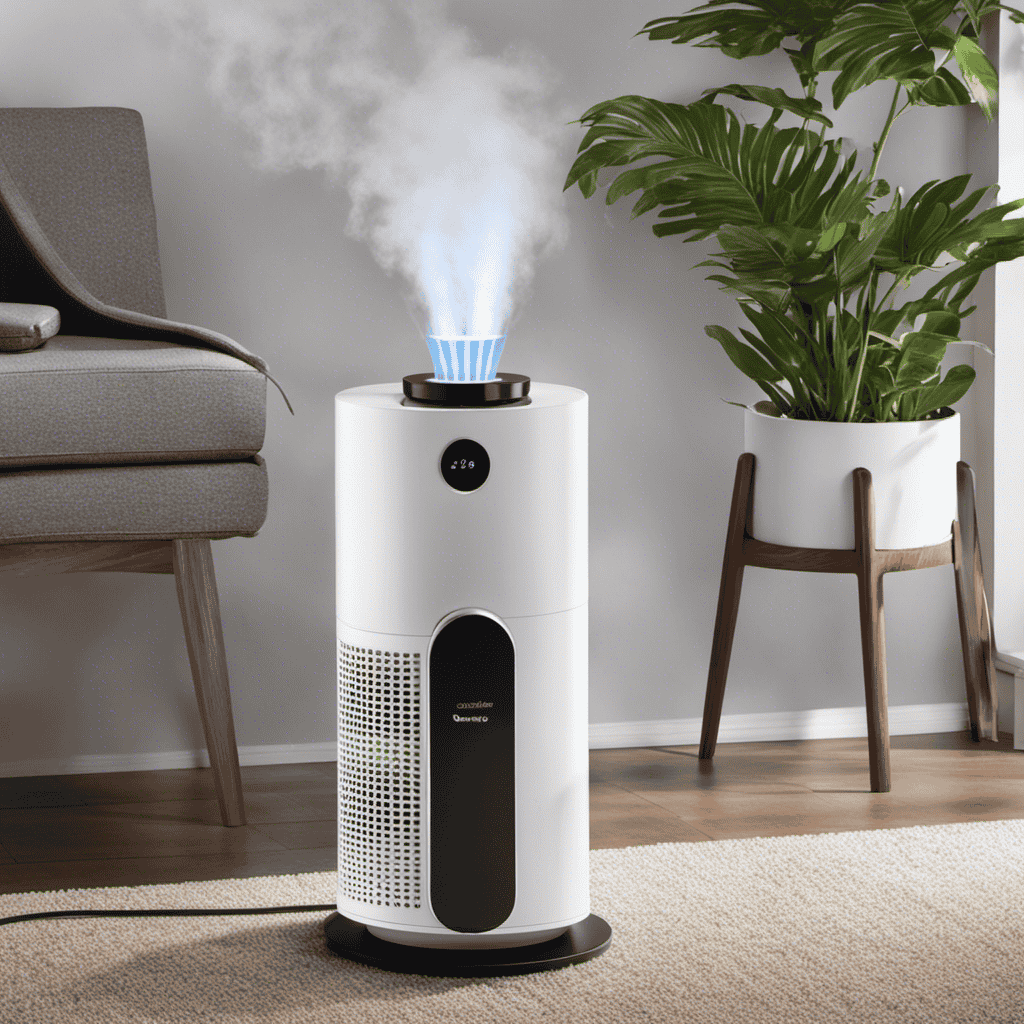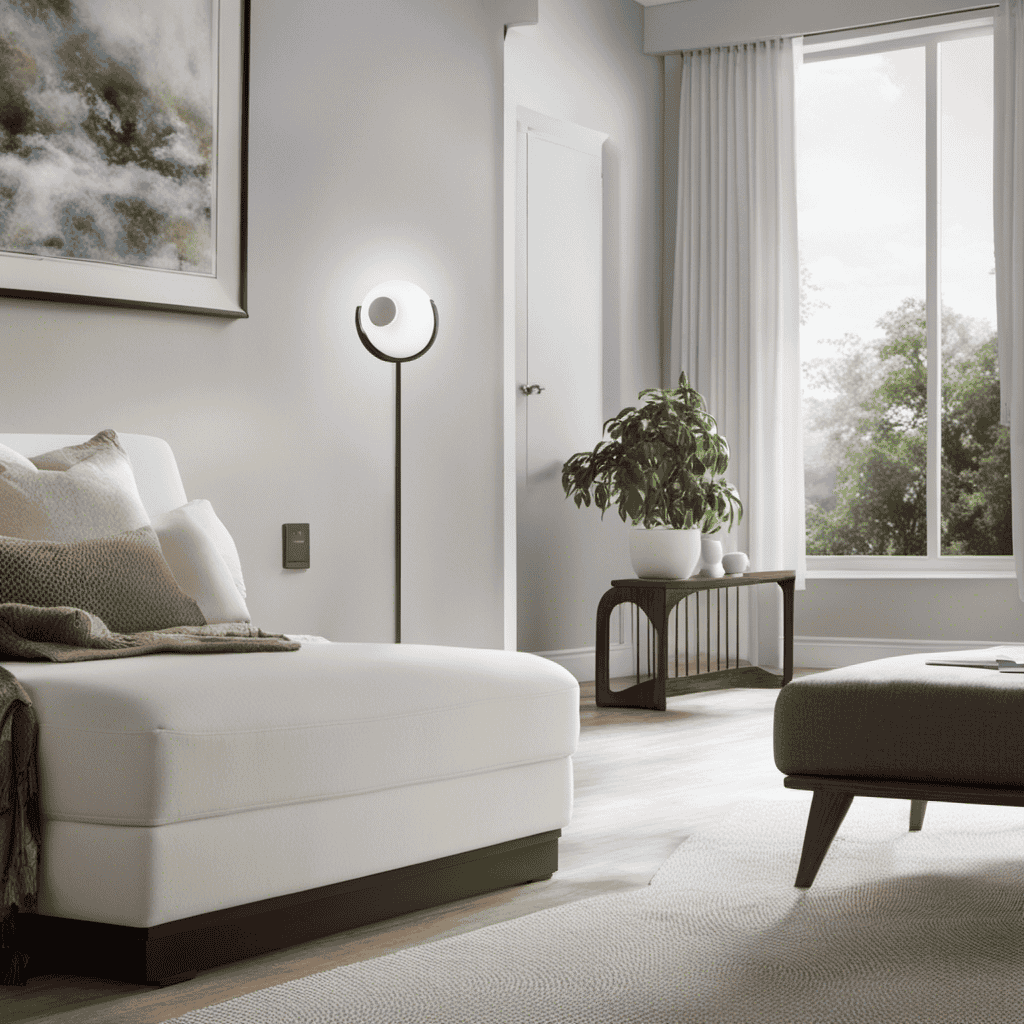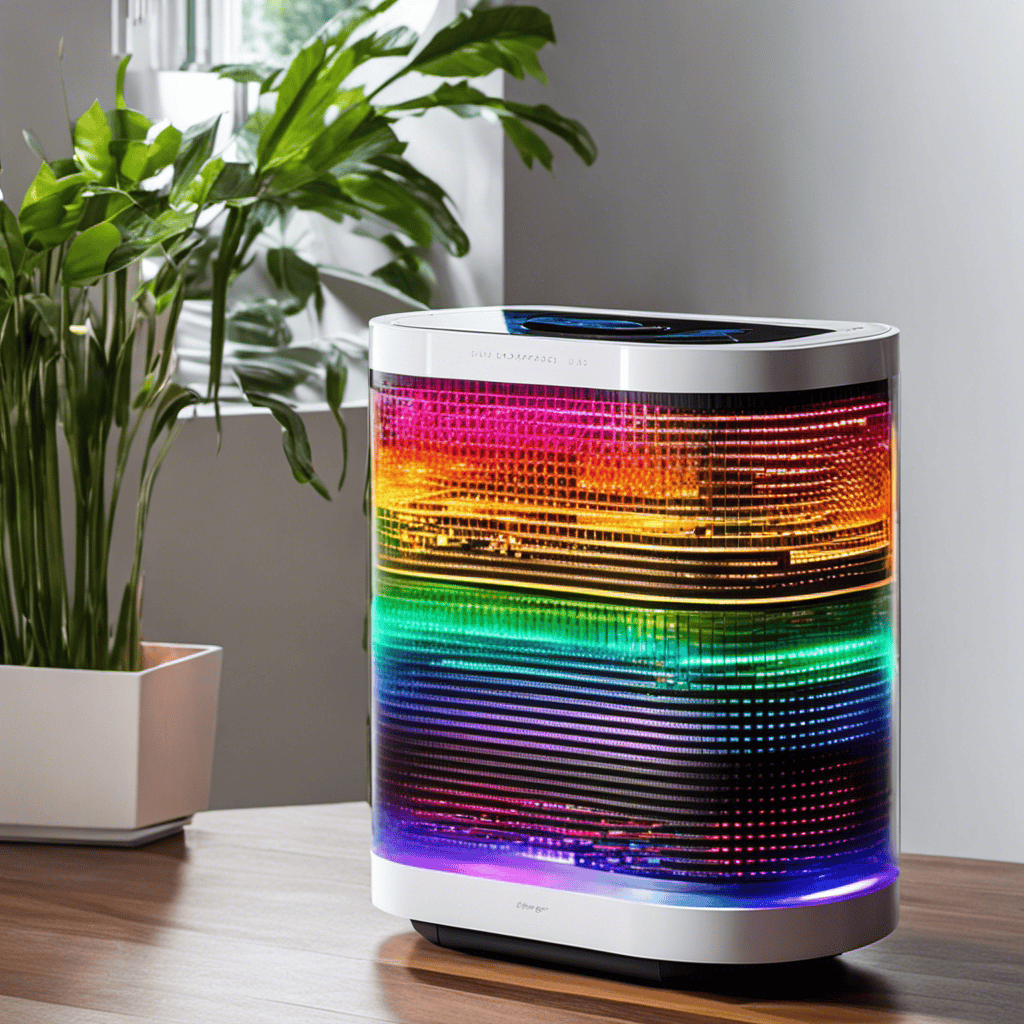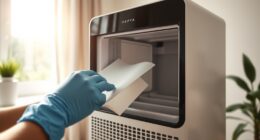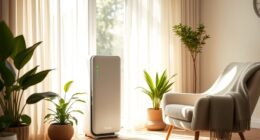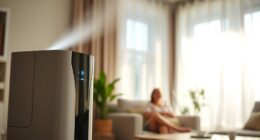I am a strong believer in the importance of clean air, and I was interested in learning more about the impact of anions in air purifiers. Were you aware that anions, also referred to as negative ions, play a significant role in enhancing air quality?
These tiny particles work like superheroes, attracting and neutralizing harmful airborne particles, such as dust and allergens. With their powerful ability to purify the air we breathe, anions are an essential component in air purifiers.
In this article, we will delve into the science behind anions and explore the benefits they bring to our indoor environments.
Key Takeaways
- Anions in air purifiers attract and neutralize harmful particles in the air.
- Anions improve air quality by attaching to airborne particles and removing pollutants.
- Breathing in anions improves lung function, reduces stress levels, and enhances mood.
- Maximizing anion function in air purifiers requires regular cleaning and maintenance.
The Science Behind Anions in Air Purifiers
Anions play a crucial role in air purifiers by attracting and neutralizing harmful particles in the air.
Negative ions, or anions, are molecules that have gained an extra electron, giving them a negative charge.
These ions are created by air purifiers and released into the air, where they bind to positively charged particles such as dust, pollen, and bacteria.
By attaching to these particles, anions make them heavier and cause them to fall out of the air, effectively removing them from the environment.
Additionally, anions have the ability to break down certain pollutants through oxidation reactions, further improving air quality.
The electrical properties of anions in air purification make them an effective tool in combating air pollution and creating a cleaner and healthier indoor environment.
How Anions Improve Air Quality
Using an air purifier with anions can help improve the quality of the air in your home. Anions, also known as negative ions, are molecules that have gained one or more negative electrons.
Here’s how anions work and the impact they can have on your indoor air:
-
Neutralizing pollutants: Anions attach themselves to airborne particles such as dust, pollen, and smoke, causing them to become too heavy to float in the air. This helps to remove these pollutants from the air you breathe.
-
Fighting odors: Anions can also neutralize odors by breaking down the molecules that cause unpleasant smells. This can be especially beneficial for homes with pets or cooking odors.
-
Enhancing respiratory health: Breathing in anions has been shown to increase the flow of oxygen to the brain, improve lung function, and boost overall respiratory health.
-
Reducing stress and improving mood: Anions have been found to have a calming effect on the body and mind, reducing stress levels and promoting a better mood.
Incorporating an air purifier with anions into your home can help create a cleaner and healthier indoor environment for you and your family. So why not give it a try and experience the positive impact of anions firsthand?
Benefits of Anions in Air Purifiers
If you’re looking to improve the air quality in your home, incorporating an air purifier with anions can have a range of benefits.
Anions, also known as negative ions, play a crucial role in air purification. These tiny particles are electrically charged and help to neutralize harmful pollutants in the air. By attaching to airborne particles, anions can effectively remove them from the air, making it cleaner and healthier to breathe.
An anion air purifier utilizes the power of negative ions to capture and eliminate various pollutants such as dust, pollen, bacteria, and even viruses. This can greatly reduce the risk of respiratory issues and allergies caused by these airborne particles.
Understanding the role of anions in filtering airborne particles is essential to fully comprehend the effectiveness of anion air purifiers.
Understanding the Role of Anions in Filtering Airborne Particles
To fully understand how anion air purifiers effectively filter airborne particles, you’ll need to grasp the role of these tiny, electrically charged particles.
Anions are generated in air purifiers using various techniques such as corona discharge, photoionization, and needlepoint ionization. These negatively charged ions attach themselves to airborne particles, causing them to become heavier and fall out of the air.
This process, known as agglomeration, helps remove pollutants like dust, pollen, and mold spores from the air we breathe. The impact of anions on respiratory health is significant. By reducing the concentration of harmful particles in the air, anion air purifiers can help alleviate symptoms of allergies, asthma, and other respiratory conditions.
Additionally, anions have been shown to improve mood, boost energy levels, and enhance overall well-being.
Tips for Maximizing the Anion Function in Your Air Purifier
By following these simple tips, you can make sure your anion function is working at its best in your air purifier. Maximizing anion efficiency is essential for achieving optimal air purification.
One common mistake with anions is failing to clean the anion generator regularly. Over time, dust and dirt can accumulate on the generator, reducing its effectiveness. Therefore, it is crucial to clean the generator according to the manufacturer’s instructions.
Another mistake is placing the air purifier in a location with limited airflow. Anions work by attracting and neutralizing airborne particles, but if the air circulation is poor, their efficiency will be compromised. To maximize anion function, place the air purifier in an open area with good airflow.
Lastly, regularly replacing the anion generator is important to ensure optimal performance. Remember these tips to maximize the efficiency of anions in your air purifier.
Frequently Asked Questions
Can Anions in Air Purifiers Help With Allergies and Asthma Symptoms?
Yes, anions in air purifiers can help with allergies and asthma symptoms. They effectively reduce indoor pollutants and improve overall air quality, making it easier for people with respiratory conditions to breathe.
Do Anions in Air Purifiers Produce Any Harmful Side Effects?
Anions in air purifiers can have health benefits, but they may also produce side effects. It is important to consider the potential risks and benefits before using an air purifier with anions.
How Long Do Anions in Air Purifiers Last Before Needing to Be Replaced?
Anions in air purifiers last quite a while before needing replacement, similar to a long-lasting battery. Their longevity greatly depends on usage and maintenance. They continuously work to improve air quality by neutralizing pollutants.
Can Anions in Air Purifiers Eliminate Odors From Cooking or Pets?
Anions in air purifiers can help eliminate odors from cooking or pets by neutralizing the charged particles that cause the unpleasant smells. Regular maintenance ensures the efficiency of the anion air purifier.
Are Anions in Air Purifiers Effective in Removing Airborne Viruses and Bacteria?
Anions in air purifiers can effectively remove airborne viruses and bacteria. They have a positive impact on indoor air quality by neutralizing harmful particles and improving overall air cleanliness.
Conclusion
In conclusion, anions play a vital role in air purifiers. They attract and neutralize harmful particles, resulting in cleaner and healthier air. By emitting negatively charged ions, these devices effectively trap and remove pollutants, allergens, and even viruses from the atmosphere.
The benefits of anions in air purifiers are numerous. They include improved respiratory health, reduced allergies, and increased overall well-being. Remember to optimize your air purifier’s anion function by regularly cleaning and maintaining the device.
So, go ahead and enjoy the fresh, purified air. Anions have got you covered!
